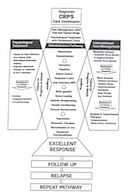Immobilization is a possible cause and/or perpetuating factor in the syndrome; therefore, normalized movement is essential in treating central changes linked with the syndrome because kinesiophobia appears to be a dynamic clinical factor in CRPS.
Occupational therapists are one of several therapeutic leaders in the functional restoration process because they are knowledgeable of the biopsychosocial principles of CRPS and are primary in functional assessment and treatment.
Physical Therapy must be executed within the patient’s tolerance, and never when the affected limb is insensate (such as immediately after a block). Advanced CRPS patients will present with myofascial pain syndrome of the supporting joint and myofascial treatment is critical to optimize outcome.
Pharmacotherapy in CRPS achieves the greatest benefits when used in conjunction with an interdisciplinary approach to treatment. In treating CRPS, the clinician constructs a drug regimen that draws from two classes of medications: prophylactic drugs (for maintenance) and abortive drugs (rescue agents, PRN) for breakthrough pain or symptom flares. Gabapentin,
Pregabalin, and Carbamezepine are the only anti-inflammatory drugs with strong evidence in CRPS. Antidepressants (SSRI, SNRI) assist in managing comorbidities in CRPS, such as major depression and anxiety.
Cognitive-behavioral therapy targets learned disuse, fear of pain, cognitive responses to CRPS (e.g., catastrophizing), life stress, and emotional distress that may contribute to maintenance or exacerbation of the disorder. Relaxation Response training including breathing techniques, progressive muscle relaxation, autogenics, and imagery helps patients gain control over their symptoms. Targeting family’s reinforcing responses to the patient’s pain is helpful in addressing problems with learned disuse and dysfunction.
In order for psychological interventions to be successful, patients must be willing to accept responsibility for managing their condition. Facilitating this cognitive shift to self-management is the first step necessary to achieve success in both functional and psychological therapies. Psychological treatment in combination with PT may facilitate increased gains in a rehabilitation-focused approach to CRPS management. Multiple interventional therapies including nerve blocks, infusions, stimulators, and implants have been used over the years for management of CRPS.

CRPS Functional Restoration Algorithm
